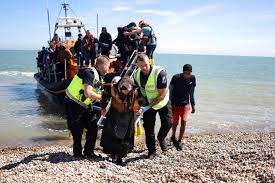UK government consults on safe and legal routes for refugees

London: Local authorities will be consulted on plans to determine an annual cap on the number of refugees resettled in the UK each year, based on the UK’s capacity to accommodate and support people coming to the UK via safe and legal routes, as the government continues work to deliver its plan to stop the boats.
The UK-wide consultation will seek to better understand the capacity of local authorities to accommodate and support vulnerable and at-risk people coming to the UK via safe and legal routes – with a view to the UK taking only as many refugees as local communities can support.

Local authorities play an essential role in helping to resettle refugees and ensure they have the best start to rebuild their lives in the UK, from providing housing, help and access to education and job support. However, the UK’s ability to welcome people through safe and legal routes has been impacted by the unsustainable rise in illegal crossings which has put insurmountable pressure on local public services and housing. This has not only impacted communities but also the number of people the UK is able to provide protection to and the level of support offered to refugees.
With a clearer picture of the UK’s capacity to welcome refugees, through the cap, the government will be able to redouble efforts to help more people from all over the world to come through safe and legal routes and ensure that commitments made by councils can be met now and in the future. This will create a more sustainable and well-managed system that is fairer and prioritises both local communities and refugees.
The cap will include the main safe and legal routes used by vulnerable and at-risk people, including the UK Resettlement Scheme (UKRS), the Afghan Citizens Resettlement Scheme (ACRS) and the Community Sponsorship Scheme.
The UK has a proud history of providing protection for those who need it and offers some of the most generous safe and legal routes anywhere. Since 2015, a safe and legal route has been offered to over half a million men, women and children seeking safety.
Immigration Minister Robert Jenrick said: “The unacceptable number of people making illegal, dangerous and wholly unnecessary small boat crossings is placing an immense strain on housing and services across the UK.
As part of the Illegal Migration Act to stop the boats, we will bring in a cap on our safe and legal routes informed by the capacity of local authorities. This will ensure that we do not take more refugees than our public services and communities can cope with and that the refugees we do decide to take can be properly supported and integrated.”
The Illegal Migration Act 2023 included provisions for a cap on the maximum number of people to come to the UK each year via safe and legal routes. While the government’s consultation is open to local authorities, NGOs and charities who provide accommodation and support are encouraged to work with councils to help provide a clear picture of capacity in local areas.
The cap does not include the Ukraine visa schemes, the Afghan Relocation and Assistance Policy (ARAP), the Hong Kong British National (overseas) route or the Mandate Scheme. However, the government is also asking local authorities to consider the impact of these routes in their responses to ensure an accurate picture of their capacity.
The cap will be agreed in Parliament and will launch in January 2025.
Under the cap, the number of people who can come to the UK will be able to be changed each year, taking into consideration capacity in local areas, for example in response to a humanitarian crisis.
In addition to the consultation, through the Illegal Migration Act, in January 2024, a report will be laid before Parliament which will set out what is meant by safe and legal routes, detailing existing routes and any proposed additional ones, and how they can be accessed by those most in need.





